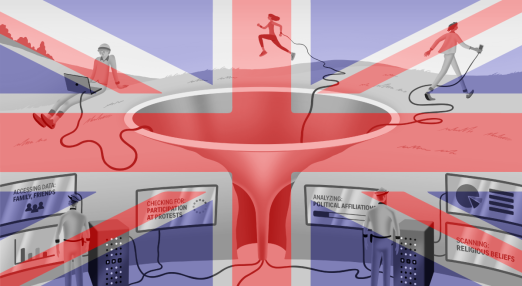data protection
Filter by...
-

The UK Data Reform Bill and the British Bill of Rights: a tragedy in two acts
The dust hasn’t settled since plans to undermine everyone’s right to data protection were announced, but the UK Government are at it again. Plans to ditch the Human Rights Act in the UK were just unveiled, in a combined effort to steamroll the rule of law and the freedoms we have always taken for granted. EDRi member Open Rights Group explains how the impact of this constitutional butchery reverberates in data protection, and why both the Data Reform Bill and the Bill of Rights follow a common thread.
Read more
-

The state of privacy at Dutch municipalities
EDRi member Bits of Freedom has done research on the General Data Protection Regulation (GDPR)-compliance within the ten largest municipalities of the Netherlands. Unfortunately, most municipalities scored a failing grade, despite the fact that the GDPR has celebrated its fourth anniversary.
Read more
-

Belgium wants to ban Signal – a harbinger of European policy to come
Last week, the Belgian government launched a proposal that would ban Signal. What's going on?
Read more
-

Threat to the protection of personal data in Belgium: European civil society is concerned
EDRi, alongisde multiple civil society organisations, is the signatory of an open letter addressed to the Belgian Parliament, demanding better enforcement of the European data protection rules and guarantees of political independence of the Belgian Data Protection Authority.
Read more
-

Member in the Spotlight: Asociația pentru Tehnologie și Internet – ApTI (Association for Technology and Internet)
ApTI is a non-governmental organisation that aims to support and promote a free and open Internet where human rights are guaranteed and protected. A free Internet represents an environment where privacy and freedom of expression are respected, while an open Internet represents a guarantee for secure and rightful access to the benefits brought by information technology.
Read more
-

UK High Court rules blanket seizure of asylum seekers’ phones breached Article 8 ECHR
On 25 March 2022, the UK High Court ruled that the Home Office acted unlawfully and breached human rights and data protection laws by operating a secret, blanket policy of seizing, retaining and extracting data from the mobile phones of asylum seekers arriving by small boat to UK shores between April and November 2020.
Read more
-

Spying on couriers and AdTech using data from operators. We know the winners of the Czech Big Brother Awards
For the seventeenth time has the Czech NGO and EDRi member Iuridicum Remedium (IuRe) awarded Big Brother Awards to those who have been snooping the most into our privacy in the past year.
Read more
-

Giropay knows what you bought last summer
A customer contacted noyb after seeing a detailed list of products she had ordered in an online pharmacy and a sex shop listed in her giropay account. Such data is specially protected under the GDPR and may not be processed without consent. noyb filed a complaint against giropay with the Hessian State Commissioner for Data Protection and Freedom of Information.
Read more
-

The European Commission does not sufficiently understand the need for better AI law
The Dutch Senate shares the concerns Bits of Freedom has about the Artificial Intelligence Act and wrote a letter to the European Commission about the need to better protect people from harmful uses of AI such as through biometric surveillance. The Commission has given a response to this which is not exactly reassuring.
Read more
-

Declaration of Digital Principles: Towards a digital pillar of the EU?
On 26 January the European Commission proposed a Declaration on European Digital Rights and Principles. The Declaration will take the form of a joint solemn declaration to be signed by the European Parliament, the Council, and the Commission.
Read more
-

Technologies for border surveillance and control in Italy
This research points out that identification and categorisation systems for migrants, refugees, and asylum-seekers, rely on vast quantities of biometric data including fingerprints and facial images. It is, however, often difficult to assess how these procedures are managed. Upon identification, the aforementioned groups have limited knowledge and awareness about where and how their personal and biometric data are going to be stored and used, hindering them from countering the pressure that this flow of information puts on their subsequent living conditions in Italy and in the European Union.
Read more
-

Cross-border access to user data by law enforcement in 2021: A year in review
Law enforcement agencies around the world are getting their holiday wish list, thanks to the Council of Europe’s adoption of a flawed new protocol to the Budapest Convention, a treaty governing procedures for accessing digital evidence across borders in criminal investigations.
Read more
